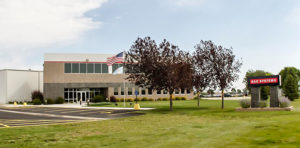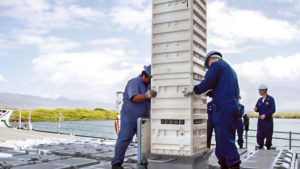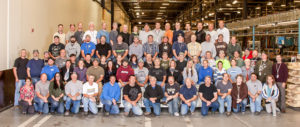

For 32 years, BAE Systems has been outfitting US battleships stationed around the world with high-quality missile canisters.
If you ask Aberdonians if they know what BAE Systems is and what they do, many might scratch their heads at first. The plant has been in Aberdeen since 1985, but unless you know someone who works there, it’s likely you have no idea that the facility north of town arms naval ships with state-of-the-art missile canisters and plays a vital role in keeping our nation safe.
This confusion may come in part from the fact that the BAE Systems facility in Aberdeen has undergone several name changes over the 32 years it has been in operation. When the company first set up shop in Aberdeen in 1985, it was part of FMC Corporation. The company merged with Harsco in 1994 and became United Defense. Then, the business was sold to BAE Systems, a global defense, security, and aerospace company, in 2005.

The BAE facility is located north of town at 3317 8th Ave NE.
Each BAE Systems location offers a unique product or service. While the site in Minneapolis is an engineering and program management facility, BAE Systems in Aberdeen focuses solely on manufacturing missile canisters for the Mk 41 Vertical Launching System (VLS), a shipboard system capable of rapidly firing a variety of missiles. It is the only BAE Systems facility that produces these canisters, each one made for a specific type of missile, from standard missile variants to ballistic missiles.
According to Site Manager Sarah Mann, BAE Systems in Aberdeen operates under a twofold mission. “The first is to safely produce a quality product on schedule at the lowest achievable cost,” Sarah said. “The second is to provide our customer, who is ultimately the warfighter, with the best products and services we possibly can.”

A missile canister is loaded onto a ship, where it will be used to fire missiles from the Mark 41 Vertical Launching System.
To reach its goals, BAE Systems in Aberdeen adheres to a truly unique business management philosophy. The site utilizes a high-performance work team system that empowers employees to make key decisions and in effect be their own boss. To do this, the facility has organized the 91 employees into eight functional teams: welding, machining, canister finishing, launcher ablative, electrical assembly, mechanical assembly, shipping and receiving, and maintenance. These teams are responsible for managing their safety, quality processes, schedules, audits, manufacturing procedures, and even the selection of new employees. According to Sarah, this program has been extremely successful. “It’s empowerment. It’s all about everybody managing this business as if it were their own.”
BAE Systems in Aberdeen has two core beliefs regarding its employees. One is that multi-skilled employees are more valuable to the company, and the other is that any of the technical skills required to build their products can be taught.
“We don’t expect people to come in here knowing how to weld or do electrical or mechanical assembly,” Sarah explained. “We will teach them that. Instead, we look for people who will not just survive, but thrive, in a high-performance work team environment. Every 24-36 months, employees are rotated to a new team to ensure they acquire as many skills as possible. If you’re looking for someone to tell you what to do all day every day, you won’t fit here,” Sarah said.

All 91 of BAE Systems employees posed for a group photo.
In addition to being versatile and independent workers, BAE Systems employees also must be able to adapt to the defense market’s ever-changing needs. Missiles are constantly changing and being improved, and as a result so must the canisters that hold them. Aberdeen employees collaborate with skilled engineers at the BAE Systems location in Minneapolis to develop canisters that meet customer requirements and are producible. “It’s great teamwork,” Sarah said.
When canisters are shipped from the plant, they go to a facility in Camden, Ark., where missiles are loaded before they head to weapon stations and shipyards. Because there is no contact with the customer, employees typically receive little direct feedback about how their products perform.
“You rarely get an opportunity to interact with someone who actually uses the systems onboard the ships; those are US Navy personnel and we rarely get to see them,” Sarah said.
However, employees are extremely proud on those rare occasions when they get to see the fruits of their labor in action. Every once in a while, program managers will send them footage of the products in use, and the whole plant gathers to watch it.
“There’s a pride among employees knowing they’re working for the troops and providing them with this important product. We want to give them the best we can to keep them safe and help defend our country and our allies,” Sarah said. “People talk about going to ship commissionings where the ships feature our products, and they come back and talk about how emotional and patriotic it is. You see the products we make and you are so proud of what you do.”
Sarah graduated from the University of Wisconsin-Stout in Menomonie, Wis., with a manufacturing engineering degree – an unusual career choice for a woman at that time. “I love manufacturing,” she said. “The defense industry is interesting, and it gives you a good feeling to know that what you do here makes a difference. But the thing that I really love is the people. That’s what makes this plant so special.” // – Becca Simon















